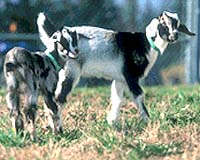 |
Paris (AFP) June 2, 2009 Genetically-engineered crops and conventional crops would have to be grown in segregated areas to meet environmental concerns about transgenic farming in Europe, agricultural scientists said on Tuesday. The so-called Co-Extra report, a four-year research project funded by the European Commission, aims at giving expert guidance into the controversy over engineered crops in the European Union (EU). Given that fields in Europe are relatively small, and winds can spread pollen from transgenic crops over large distances, co-existence of novel and traditional crops will only be possible if they are grown in "dedicated zones," it said. "The distance (between the zones) will depend on biology," said Yves Bertheau of the French agronomic research institute, INRA, in a presentation of the report to the press. "Some plants can be disseminated 30 kilometres (18 miles) away." He admitted, though, that the idea faced an array of problems. There would have to be a consensus on it, and ways would have to be found to make the scheme practical and legally definable, he said. Genetically-modified crops have a gene, or genes, inserted into them in the lab so that they acquire traits that are useful to farmers. They are widely grown in North America, South America and China. But in Europe they have run into fierce resistance, led by green groups who say the crops carry risk through cross-pollination, potentially creating "super-weeds" that are impervious to herbicides. Only one genetically-modified crop has been authorised by the EU -- MON810 maize, invented by the US biotech giant Monsanto. It carries genes that cause it to exude a toxin that is poisonous to corn pests. It was approved by the EU in 1998 but is banned in six countries (Austria, Germany, Greece, Hungary, France and Luxembourg). An attempt by the European Commission, the EU executive, to overturn the ban failed in a vote by the Council of Ministers, the paramount decision-making institution, on March 2. The United States is fiercely opposed to the ban, seeing in it a form of trade protectionism under the guise of environmental safetey. Share This Article With Planet Earth
Related Links Farming Today - Suppliers and Technology
 US state mows with goats to go gently on environment
US state mows with goats to go gently on environmentWashington (AFP) May 29, 2009 Officials in the eastern US state of Maryland have come up with an innovative, cost-saving way to protect the environment: they use goats to mow the grass. The State Highway Administration came up with the novel idea while building an 85-million-dollar road bypass near the town of Hampstead, northwest of Baltimore, after it found that the construction site was home to bog turtles, the ... read more |
|
| The content herein, unless otherwise known to be public domain, are Copyright 1995-2009 - SpaceDaily. AFP and UPI Wire Stories are copyright Agence France-Presse and United Press International. ESA Portal Reports are copyright European Space Agency. All NASA sourced material is public domain. Additional copyrights may apply in whole or part to other bona fide parties. Advertising does not imply endorsement,agreement or approval of any opinions, statements or information provided by SpaceDaily on any Web page published or hosted by SpaceDaily. Privacy Statement |